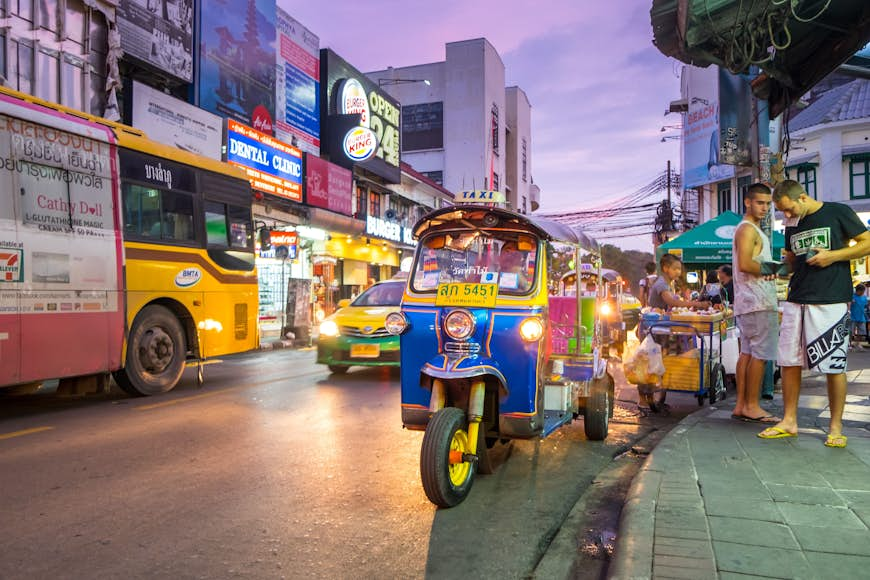Lonely Planet’s “Give it a Try” series is all about making a case for obvious travel experiences that may have been discounted for being too touristy or popular. Here, photographer Austin Bush – a Thailand local – explains why you need to see beyond the neon and noise to appreciate Bangkok’s Khao San Road.
Khao San Road is ostensibly the most famous backpacker crash pad in the world, but given the loud, raucous vibe, inflated prices, and pushy tuk-tuk drivers, it isn’t exactly where I tell friends or family to stay when in Bangkok (my on-and-off hometown). But this doesn’t mean they shouldn’t visit. Behind all the neon is a fascinating backstory. And, well, all that neon means that Khao San Road is the base for a fun, very Bangkok night out.
9 of the best hikes in Thailand
Khao San Road’s backpacker beginnings
Although it may not be immediately apparent, there’s some history behind all those hotel facades. Khao San Road was previously linked to the Chao Phraya River by a canal, which meant it was a conduit for goods shipped via river. In particular, khaao saan is Thai for “milled rice,” and going back to the 19th century, the street was lined with shophouses selling the stuff. One could argue that business didn’t really shift until 1977, which is when the author of Lonely Planet’s first guide to Thailand, Joe Cummings, visited Khao San Road in search of cheap accommodation. He found a couple inexpensive, Thai-Chinese-run hotels and three family-run guesthouses, which he later included in 1982’s Thailand: A Travel Survival Kit.
I first stayed on Khao San Road in 1997, when the strip was well established but still largely catering to a budget crowd. The backpacker boom of the late ‘90s and the early 2000s paved the way for the flashpacker hotels, beachy bars and dance clubs that define the street today. The pandemic could have meant the death of Khao San Road, not only due to the total absence of tourists but also because Bangkok authorities were mulling plans that ranged from forbidding street vendors to building a roof that would cover the street. Thankfully, the tourists have come back, and few of these schemes were ever carried out.

Counterculture vibes
Khao San Road became a stop on the hippie trail of the late ‘70s and early ‘80s, drawing alternative thinkers from across the globe. It’s also only a few blocks from Silpakorn University, Thailand’s premier institution for visual and performing arts, and a bastion of liberal thought. During more conservative eras, Thai students, drawn to the street’s cheap beer and open-minded foreign population, made it a hangout.
The backpacker boom of the ‘90s and exposure in the 2000 Hollywood film The Beach made Khao San more mainstream and more expensive, spooking many of the students to the smaller, cheaper side streets. In the early days of the COVID-19 pandemic, Khao San Road was deserted, leaving a vacuum that was, once again, filled by university students in search of inexpensive beer. These days, the recent decriminalization of marijuana in Thailand has led to streetside vendors selling stacks of buds, an oblique nod to Khao San’s counterculture roots.
Cannabis is now legal in Thailand, but it’s complicated

How to have a great night out in Khao San Road
Pro tip: Avoid Khao San Road during the day. Arrive at night when the air is cool, the street is closed to traffic and the pushy tuk-tuk drivers and scammers have (mostly) gone home. Start with a falafel plate at Shoshana, a Khao San staple since 1982. Next, transition to one of the streetside bars and engage in one of Khao San’s greatest gifts: people-watching. There are few places in the world that have brought together so many people from so many countries. For a look at the more local side of Khao San, shift to one of the Thai-oriented bars such as Mischa Cheap. And if you’re still going at the late hours, wrap it all up at one of the raucous live music bars such as Brick Bar.
If you’re visiting Khao San from another part of Bangkok, make a trip of it: Hop on the river canal boat, hopping off at Phanfa Leelard Pier. From there, head south then west, winding through Ko Ratanakosin, formerly an artificial river island that is Bangkok’s oldest and most charming neighborhood.
In Bangkok’s high tourist “winter,” between November and January, Khao San hosts thousands of visitors and partiers and is quite something to be seen. In previous years, the street has also been Ground Zero for some of the city’s most raucous water battles during Songkran, Thailand’s New Year.
VS Guest House, located on a tiny, unnamed sub-street that heads north from the easternmost end of Khao San Road, and open since around 1980, is allegedly the oldest operating guesthouse on the strip.
What to eat and drink in Thailand
